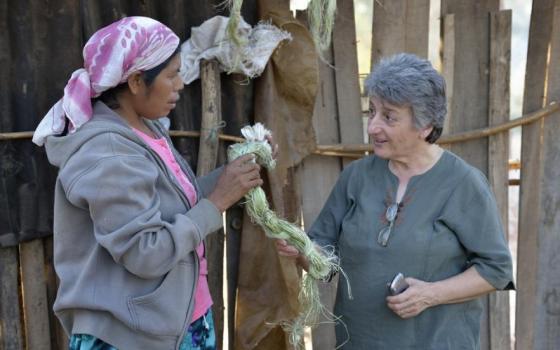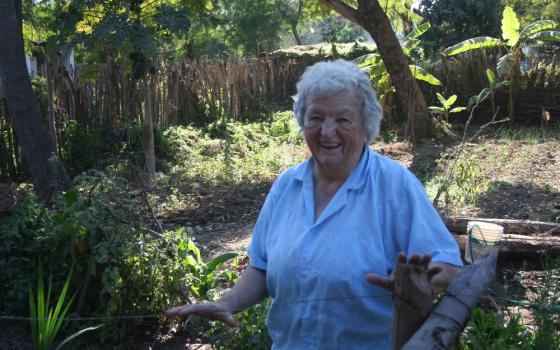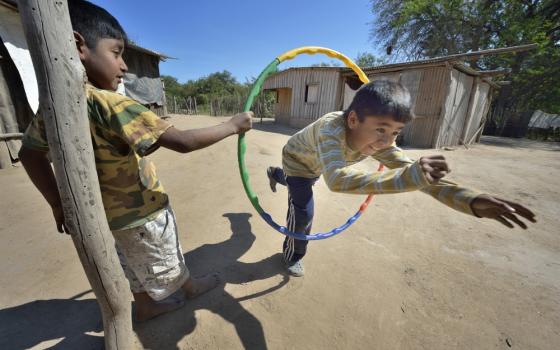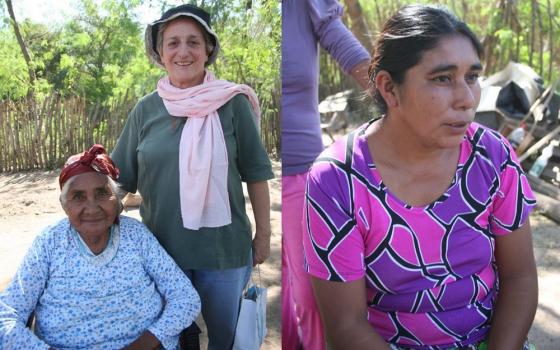They arrived in northern Argentina in the 1980s, a time of change and hope for a country that had grown weary of a military dictatorship.
Wanting to try something new, the Catholic sisters eschewed paternalism and instead chose to “accompany” indigenous communities in this often neglected region in their quest for recognition, justice and concrete improvements in day-to-day life.
Today, their mission is still at work, but wrestling with questions of its role in a new time of rapid change. And the sisters sometimes wonder if their work is still relevant
“We’ve been enriched living here, and we’ve been accepted here. We have people’s trust,” said Sr. Norma Chiappe, 59, a member of the Franciscanas Misionera de Maria – the Franciscan Missionaries of Mary.
But the changes afoot in Argentine society – including the embrace of what Chiappe and others call a consumer society – are worrisome, they said. “Dangerous,” Chiappe believes.
Not all agree with Chiappe, and therein lies a story of encroaching modernity in the Gran Chaco, the largest dry forest in the world, an area twice the size of California that spreads over three countries – Bolivia and Paraguay, as well as Argentina.
The region is home to more than two dozen indigenous groups, including Chiappe’s neighbors, the Wichi.
Recently, Chaco indigenous communities like the Wichi have steadily regained access to ancestral land lost during centuries of displacement, exploitation and genocide. Successful legal cases have given the ethnic groups title to land once used for hunting and gathering by their ancestors.
One winner: Lote 75, a small community where residents recently received legal title to about 860 acres of land.
Such victories now make the Chaco a place of reckoning and realignment. But the indigenous groups also find their new neighbors are representatives of the global economy: companies shipping wood, soya and other resources to Asia and Europe.
And their ancestral lands are not always in good shape – denuded ground, poor farming and cattle grazing practices and the noticeable wear of climate change have all taken a toll on this often-hardscrabble land.
Luckily, Lote 75, a small community of a few hundred people on the outskirts of the northern Argentine city of Embarcación (population 24,000) looks in relatively good shape. Though Embarcación is at the end of a rail line that once stretched from the capital of Buenos Aries all the way north to sugar cane country, Lote 75 is shaded and tree-lined, and a number of homes, such as that of the sisters, have impressive kitchen gardens.
Some 550 people live here – about 120 families in all – and many residents make their living from seasonal work on agricultural estates; some of the women work as domestic servants and also make handicrafts. The crafts were an initiative originally begun by the sisters. The vegetables from the garden, as well as some goats and pigs, are raised mainly for family consumption, but some are also sold in Embarcación.
Over dinner recently, Chiappe and fellow order member Sr. Regina Piccoli, 72, both nuns raised in Italian-Argentine households, recalled life when they arrived in the early 1980s.
“Horribly Catholic,” is how Chiappe describes what came before – a place where the church largely did not question a social order in which sugar cane plantation owners held dominion over many. In its pastoral work, the church tended to work in what she described as paternalistic ways.
In the past, nuns remained in the convent, “so, so far from the people,” said Chiappe. “It was wrong to live so far from the people.” (The sisters’ order has been in the region since the 1930s.)
Things began to change in the 1970s and 1980s when liberation theology started to imprint Argentina. But even then, major blocs of the church still supported the military dictatorship. The junta remained in power until the fallout from the 1982 Falklands War helped topple it. (In Argentina that war is referenced by the Spanish name of the disputed islands, the Malvinas.)
While both sisters have had intermittent assignments elsewhere through the years, their hearts have always been here. They feel largely affirmed by the local diocese, which has had a strong pro-indigenous stance and ministry. “The priests have not tried to interfere with us,” said Piccoli. “We have felt supported.”
Perhaps. But both sisters said occasionally they have felt the cold frost of disrespect by their male colleagues – men still tend to dominate situations, they said – and both are keenly aware of a hierarchy based on gender. “Nuns are the cheap labor of the church,” said Chiappe. “We work for little pay.”
Of the two, Chiappe is the more outspoken and opinionated, and with a stylish scarf worn around her neck, cuts a slightly elegant figure. When a journalist kidded her about being particularly a good observant of things and people, she shot back: “I’m a nun.” Piccoli, meanwhile, is the more retiring and informal of the two, and seems to enjoy nothing more than puttering in the garden.
The sisters’ work and their specific approach toward ministry – to live within and among an indigenous community – and the overall change of attitude by the institutional church toward the indigenous – did not endear the sisters or other religious to one sugar estate owner. As Chiappe described him, the man “didn’t want change; he thought God ordained people to be poor so they could work on his estate.”
Later, she elaborated a bit on this description: “There are two churches: the official church, the church of the truth, but there is a material church that responds to people’s needs. That church interacts with the people.”
______
A country that produced a now-popular pope (well-liked by the sisters), literary giants like Jorge Luis Borges and several Nobel Prize winners in other fields has also had to deal with the legacy of a military dictatorship, clashing economic models and questions of how to develop as a “modern” country.
Like the United States more than a century ago, Argentina was a destination for European immigrants, Italians in particular, in the early 1900s. The changes immigration wrought were considerable, and came almost overnight. What emerged was a national identity priding itself on being a modern, dynamic country. But what historian Julio Djenderedjian called the sudden “appearance of modernity” concealed “significant continuities” in an unequal social and economic order. “Progress did not come equally for all, nor did it affect them with the same intensity,” he writes.
This is an understatement when viewed through the lens of the indigenous communities, which were nearly wiped out in genocidal conquests, such as the so-called “conquest of the desert” of the late 1870s. The “moderization” that followed cast indigenous people as second-class citizens, a legacy that has continued. One telling example: Argentina’s national illiteracy rate is 2.6 percent. But among the indigenous, it is nearly 10 times that amount, at 20 percent.
Chaco indigenous leader Francisco Perez, who has spent decades fighting for land rights, put it this way: “‘Civilize them,’” he said, “is still the mindset here.”
This is the environment in which Chiappe, Piccoli and others have worked. They describe their initial years – tackling problems like schooling, the need for bilingual (indigenous and Spanish) language instruction, developing training in crafts and carpentry and bringing potable water to the community – as good, fruitful times.
Due to a strong presence by Anglican missionaries, the sisters agreed their work would not require a Catholic parish in the community. Through the years, the sisters have attended Anglican services while also regularly attending Mass at a nearby Catholic church.
“We’ve remained loyal to the original agreement. It’s a Christian community. They believe in Jesus, we believe in Jesus,” Chiappe said.
The sisters can claim success in a number of areas, like schooling, where children are now going way beyond the third grade. Certainly the fact that the community now has title to the land is a big victory.
Piccoli also mentions a key initiative related to food: the appearance of the kitchen gardens throughout the community, a point of pride for her in particular. “People are always eating tomatoes and beans, corn and squash, chard, lettuce,” she said.
Yet the sisters acknowledge that 30 years ago was a more invigorating and interesting time. They acknowledge that their own age might have something to do this: the inevitable glow of looking back on idealistic youth. But they also say that that was a moment when the promise of something new and liberating was in the air; the military dictatorship had just ended and there was hope.
Now, they say, government at all levels is employing what they say is a “client ideology,” buying votes and corrupting the grass roots – and all of this occurring amid the growing encroachment of a market-driven consumer society they believe threatens what is distinctive about indigenous culture: respect for the land, reverence for family and a communal approach toward life.
One long-time resident was stark in an assessment: “All people want is a motorbike and a job that doesn’t require any work.”
That may sound harsh. But what Chiappe and other Argentines who work with non-governmental organizations lament are some of the effects of social welfare policies implemented by the government of the late Néstor Kirchner and his wife and successor, Cristina.
The worry, as explained to me by a humanitarian worker and veteran observer of social developments in Argentina, goes something like this: “In the past five years in particular there has been an increase in what are called social plans – universal child allowance, unemployment benefit, support for women-only headed households” – which have had tangible effects and have lifted people, particularly indigenous people, out of the worst of poverty.
These plans aren’t handouts per se – one of the conditions for receiving a child allowance, for example, is proof that a child is attending school and receiving regular health check-ups, the observer noted.
But there have been fallouts, the most glaring being that these plans have become politicized.
“People are threatened by local political leaders that if they don´t vote for the Kirchner government they will lose their social welfare plans,” the observer said. “Many grassroots movements, once radical, have been co-opted by these political leaders and there is a vacuum in terms of real political dialogue and debate.”
Complacency has set in; some worry that people have become apathetic and lethargic. Chiappe, for example, regrets that the women’s sewing and crafts group she helped found has largely dispersed now with the ease of people receiving benefits.
Because of the power of what might be called patronage politics, people are now less interested in the cause of sustainable social change, some say. Obviously, those advocating for the poor are reluctant to speak on the record against policies that provide people with just a minimum level of income; it is difficult for a family to make ends meet on government programs alone, they note.
Still, it is telling that these critiques of government programs are not coming from the right, but from the left. “These social programs . . . tend to weaken autonomous mobilization from below by depoliticizing the question of poverty, turning inequality into an administrative problem, and creating a support base for the state independent of unions and social movements,” notes the introduction of a recent book, Until the Rulers Obey: Voices from Latin American Social Movements, edited by Clifton Ross and Marcy Rein.
______
The issues seemed bigger in the past – the school, the land issue, Chiappe said. Today people have better political connections but smaller horizons. As a result, she and the other sisters feel at times they are being sidelined.
“Today we feel impotent,” Chiappe said, adding that a host of issues like climate change (“We can feel the land changing”) await the next generation.
Older leaders like Francisco Perez acknowledge a yearning for the old nomadic ways of hunting and living off the land. Younger indigenous people, however, tend to romanticize less and are more pragmatic and accepting of these changes, be it the introduction of more processed food in the diet, or the fact that younger people are setting their sights less on the land and more on living in urban environments, where there are better job opportunities – though, it must also be said, more racial discrimination.
The young people “are stuck between two worlds,” a humanitarian worker told me. Many are now thinking about selling recently titled land so they can purchase homes in the city.
Is this good or bad? One telling moment occurred when a European visitor to the region responded to a respected English anthropologist and writer who has lived in the Chaco, and like Chiappe, bemoaned the changes.
“It was as if the anthropologist was saying that culture should be ‘pure’ and uncontaminated by consumer society, and that indigenous shouldn’t live in the contemporary world but instead in some kind of indigenous paradise,” the visitor said.
A paradise, of course, that no longer exists.
______
In the home that Chiappe and Piccoli share with a third member of the order, I asked Chiappe what she meant when she said changes are dangerous. Largely, she replied, that the things from the outside – urbanization, a change in diet, the desire for work over a nomadic life, the embrace of consumer society – were not of their own making. It feels imposed. The consumer society, she said ruefully, shaking her head, “is so strong. Strong, strong, strong.”
Later in the morning we went outside to meet some people in the community; among them was 80-year-old Eliodora Rojas, who has lived here nearly 60 years.
“We have a sense of tranquility because the land is ours,” she told me. “Now we have legal title and a sense of permanence. Today is better than in the past.”
Still, at her age, she sees the continuities of life, not the breaks with tradition. She is glad to be here, on land that is settled, with her family around her.
Her son, Evaristo Romero, a 50-year-old language teacher, wears a polo shirt emblazoned with a logo from the American-held multinational agricultural corporation Cargill. He shares his mother’s optimism, seeing good in continuities – he and the family speak Wichi at home, for example – but also good in changes, like the ways women now have stronger voices in the community.
One key here: many see the present as a time of opportunity, with schooling now stressed for both male and female students and the availability of scholarships more common than before. Romero is happy to see young people being given a chance to study, develop skills and perhaps become professionals. His robust optimism is in marked contrast to Chiappe’s pessimism.
“It’s like a breath of fresh air,” he said. “It’s a joyful time for us.”
Romero is not particularly bothered by the fact that young people are leaving the community; he sees that as a continuity of sorts: “Some leave, some stay,” he said. “It’s part of the nomadic tradition.”
One of Eliodora Rojas’s granddaughters, Maria Silvia Romero, said she disagrees with her grandmother about the continuities; Indians and non-Indians are now interacting far more than before, she notes; Wichi are now policemen in town, for example.
She embraces the changes for women, though notes that she herself has been trained as a health worker but has not yet gotten a job. Romero supports herself by tutoring children after school.
Chiappe acknowledges she and her neighbors have a different take on the changes facing their small community; that she is more pessimistic than her neighbors. She shakes her head about Romero not being able to find a job in her profession: That is typical of an uncertain market economy that leaves too much uncertainty in its wake, she said.
In another sign of pessimism, she notes that a Frenchman owns a nearby soybean field – all for export – and has covered the land in pesticide.
At the end of a morning’s talk, a group of gleeful children pointed the way to the field.
Chiappe shook her head and said political leaders have failed the community “We can’t win the battle.”
[Chris Herlinger is a contributing writer to Global Sisters Report and NCR, an author and senior writer for the humanitarian agency Church World Service.]




